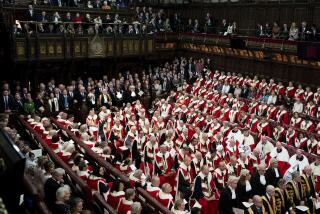Britain’s House of Commons speaker, Michael Martin, resigns
- Share via
LONDON — Battered by a scandal over politicians’ expense accounts, the speaker of Britain’s House of Commons bowed to the inevitable and announced his resignation Tuesday, becoming the first person to be forced from the post in more than 300 years.
In a terse statement lasting just 30 seconds, Michael Martin told his fellow lawmakers in Parliament’s lower chamber that he would step down June 21.
“Since I came to this house 30 years ago, I have always felt that the house is at its best when it is united. In order that unity can be maintained, I have decided that I will relinquish the office of speaker,” Martin said, dressed in the post’s traditional black robe.
He announced that a successor would be chosen June 22, then added, “That is all I have to say on this matter.”
It was almost an anticlimactic end to days of suspense over Martin’s future, as a growing chorus of lawmakers expressed a loss of confidence in his leadership of the often unruly House of Commons.
Martin was criticized heavily for his tone-deaf response to ongoing revelations that members of Parliament had claimed reimbursement from the public kitty for, among other things, the cost of manure to maintain one lawmaker’s garden and a massage chair for another’s London apartment.
Other legislators allegedly claimed tens of thousands of dollars in housing allowances for homes that they bought, renovated, then sold at large profits.
A junior minister has already stepped down from his government post because of the spiraling scandal, and other members of Parliament have tried to assuage a groundswell of public anger by issuing abject apologies over their liberal expense accounts.
Martin sparked further outrage when he asked police to find out who had leaked the expense information to the Daily Telegraph and when, in a testy exchange, he berated a fellow lawmaker for suggesting that the expense claims themselves were the problem, not how they were brought to light.
To many Britons, Martin seemed more intent on spin control and preserving parliamentary privilege than on trying to restore the chamber’s credibility and regain public trust.
In the end, an apparent withdrawal of support from Prime Minister Gordon Brown helped seal Martin’s fate. But it also left Brown appearing severely weakened by the scandal at a time when his personal poll ratings and that of his ruling Labor Party are at a major low.
Brown said Tuesday that “fundamental reform” was needed to make Parliament’s workings more transparent, the key being a switch from self-regulation to regulation by an independent outside agency. “Westminster cannot operate like some gentleman’s club where the members make up the rules and operate them among themselves,” Brown told reporters.
Martin’s announced departure marks the first time a speaker has been forced from office since 1695, when John Trevor’s ill-judged acceptance of a bribe resulted in his ouster.
“There is no modern-day precedent for a speaker being voted out of office,” the BBC reported on its website, adding that, “in the old days (before 1560), seven were beheaded and one murdered.”
Like the speaker in the U.S. House of Representatives, the leader of the House of Commons chairs debates and wields great influence over who and what gets heard in the chamber.
The post is technically a nonpartisan one.
Martin, 63, has held the office since 2000, the first Roman Catholic to do so since the Reformation.
His successor will be chosen under new rules allowing for secret ballot by lawmakers. Following one of the rituals for which Parliament is famous, the winner of the vote is dragged to the speaker’s chair in a show of feigned reluctance to take on the job. As a formality, the selection must also be approved by Queen Elizabeth II.
--
More to Read
Sign up for Essential California
The most important California stories and recommendations in your inbox every morning.
You may occasionally receive promotional content from the Los Angeles Times.











